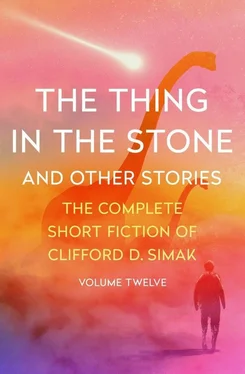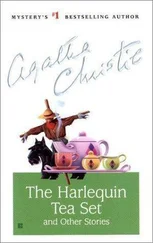“Sorry,” he said. “Sorry that I talked like that.”
“Where’s Luke and Matt?”
Parker shook his head. “Down the canyon somewhere, I guess.”
He nodded at a niche between two boulders. “Get in there and stay,” he told her. “Pure hell is apt to break loose any minute.”
She slid into the niche and Parker crouched, sixgun ready, watching the trees and underbrush. They’ll be working up the hill, he told himself, to get above us, and when they do, this nest of boulders wouldn’t be worth a damn as a thing to hide behind.
Up the hill a rifle spat. A man’s shriek rose above the din of the shot and then chopped off.
Parker tensed. That gun!
It spat again and a man was running through the trees, twisting and doubling like a hunted deer.
Deliberately, Parker lined him in the sights and pressed the trigger. The runner stumbled, crashed to the ground and bounced, flapped against a tree and then lay still.
The gun took up again, deliberate, steady, like a cornered bear.
“Matt!” yelled Parker. “Down this way, Matt!”
The old man whooped at him from up the hillside: “We got them on the run, lad. Open up!”
The bark of the .45-70 cut off his words and snapping, snarling rifles answered back.
A new sound came in, far off to the left—the steady rattle of a rasping sixgun.
Luke! That’s Luke, Parker told himself.
He slid around the corner of the boulder, snapped his gun down on a bush overhung with powder smoke, triggered rapidly. A man burst from the bush, went zigzagging down the hill in wild, plunging leaps.
Other men were running, too. Scurrying down the hillside, plunging and sliding, running to escape the withering fire that was pouring from above them.
Parker leaped from behind the boulder, smoking sixgun snapping at the heels of the fleeing man.
His boots bit into the sloping ground, leaving long skid marks behind him as he strode down the hill, while above him old Matt’s rifle growled and Luke’s sixgun played a constant tune.
A bullet whipped past Parker’s head and a gun crashed off to the left. Parker checked his stride and swung around, saw the man standing beside the scraggly tree at the foot of the cliff.
Red-faced, bull-necked, lips twisted with bitter hate, Betz raised his gun for another shot.
Parker shot from the hip, a quick snap shot that sent the bark flying from the tree. Betz’ gun drooled fire and Parker staggered under the smashing power of the bullet that took him in the shoulder.
Numbed, Parker lifted his gun, took a slow step forward.
This one has to be good, his mind told him through the ache that spread across his body—this one has to count. If it wasn’t, he knew that he would never had another chance.
Feet planted, he held himself upright and rigid for the moment, everything else blotted out but the red-faced man and the ugly snout of Betz’ sixgun poised for another shot.
The gun in Parker’s hand spat fire, bucked against his wrist. In front of him Betz jerked as if hit by a red-hot iron. His gun dropped from suddenly limp fingers and the man bent in the middle, as if he had hinges in his stomach. When he hit the ground he was still—very still and limp.
Through a foggy haze, Parker drove his legs forward, walking toward the dead man—and stopped in astonishment.
Something rolled out from under the tree beside which Betz had stood, something that flopped and thrashed like a chicken with its head cut off.
Parker’s legs were running and his mouth was shouting:
“Egan! Egan!”
Egan struggled to a sitting position, stared at him, blood-matted black bear working as his jaws made words.
“Afraid I’d never get out,” he said. “Damn rope was fouled up with a branch.”
“But you fell,” gasped Parker. “I saw you …”
“Sure,” said Egan. “I fell into a tree. Knocked me out for a while, but it saved me. When I come to I kicked around a little and then I fell the rest of the way.”
He jerked his head at Betz.
Egan was swinging to and fro and the trees were dancing. Parker felt his knees giving way and suddenly he was sitting on the ground, face to face with Egan. He shook his head to clear away the fog and the trees stood still, jiggling just a little.
“He got you,” said Egan viciously. His eyes were on Parker’s blood-soaked shoulder.
“I hope to hell it’s bad,” said Egan. “I hope you croak, right along with Betz.”
Parker clenched his teeth. “Don’t worry,” he told the man. “I’ll live to see you behind bars …”
Feet pounded behind him and he twisted his head around. It was old Matt and Ann, tearing down the hillside. Ann a running deer, Matt a lumbering grizzly, beard floating in the wind, rifle waving in his steady hand.
Parker staggered to his feet, stood waiting them.
“We beat them, son!” yelled Matt. “We beat the britches off them!”
He stopped in front of Parker, looked soberly at the shoulder.
“Hurt bad, son?” he asked.
Parker shook his head. “Left arm won’t work for a while,” he said. “But the right’s O.K.”
To prove it, he held it out for Ann.
Old Matt was chuckling. “You and Luke thought you had the old man fooled,” he said. “Never figured I knew where you sneaked off every Sunday afternoon.”
Parker choked. “You knew about the cave all the time, then?”
“Hell, yes,” Matt told him, “but I kept my big mouth shut. Spoiled all your fun if you knew I knew.”
Parker tightened his arm about Ann, saw Luke coming through the woods.
“Everything’s all right,” he said to Ann. “Everything’s all right.”
Originally published in an original anthology entitled Frontiers 1: Tomorrow’s Alternatives , which was created by Roger Elwood and published by Macmillan in 1973 (there was a time when there was a vogue for original anthologies, and a breed of professional anthologists arose, who sometimes used a numbering system to help consumers avoid getting lost in the deluge of such), this story faded into the background of its era. But it nonetheless touched on a number of the themes Clifford Simak pursued over the years, hinting at newly sensed interconnections among them—and that, most of all, because it was so important to Cliff to explore the idea of whether humans have souls, and whether technology can help us to figure that out.
And completely overlooked is the dropped—and not pursued—suggestion that something we now call “virtual reality” could make a difference in the creation of a newer, greener, way of human life.
—dww
He came home along a country lane, with grass growing between the dust-powdered cart tracks, with low stone walls to either side, erected long ago and now crumbling with the years, but with their crumbling hidden by the growth of creeping vines and screened by the bushes that grew along their bases. A verdant countryside stretched on every hand, with sleek cattle in the pastures and the smoke of cottage chimneys trailing up the sky. Larks sang in the grasses and a rabbit popped out of its hiding place along one of the stone fences and went bobbing up the road.
The corridor cyber, Andrew Harrison told himself, had knocked itself out on this one. He hoped it would be allowed to stay for a while, for it was most restful. But he knew it wouldn’t stay. They never did. It was as if the cyber had so many patterns that it was in a hurry to get them all used up. Tomorrow, or maybe just a few hours from now, it would be the main street of a sleepy old historic village or a woodland trail or an old Paris boulevard, or perhaps some far-space fantasy. Although he doubted the patterns would ever all be used. He’d lived here—how long?—more than fifty years, and before that more than thirty years on one of the lower levels, and in all that time there had not been a repetition, close approximation perhaps, but never a repetition in the corridors.
Читать дальше












